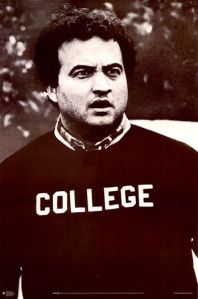
[Author's note: If you are a college freshman or the parent of one, here is a pretty good blog entry on setting up your freshman year/college career. It came from last year, and it's something I'll dig up in three years. I was struck by the candor and the good advice from the entry. Somebody hire that girl!]
Sent my kids to their first day of school. Sent my wife to her first day of school with kids. While this has become one of the most high-pressure times of the year in our family, it is also the beginning of my favorite season. School is new again. Bands are getting new music. Second (third, etc.) chances start now. The high school quarterback from last year enters his freshman year of college with three children and a scholarship. Everybody's undefeated and walks into their classes with a perfect score. Everyone is dressed in their #1 outfit and ready to go.
Not sure about that skirt my daughter wore to her first day as a sophomore, but you pick your battles. I just took the third-to-last of the ritual first day of school pictures. Kept the shot waist-up.
Beloit College has made a name for itself by producing an important list each August. The list is designed to make college professors aware of just whom they are teaching. Often, teachers (professors) see the knowledge base as stagnant; thus, they teach in similar fashion. But kids change. Young adults change. While most professors have owned cd's at one point or another, most of their incoming students have not. Digital learning is a necessity to reach students from this new era. Each year, the new freshman class comes with some eye-opening revelations. Among things professors should know about these newbies:
- Women have never been too old to have children.
- They’ve always gone to school with Mohammed and Jesus.
- Grown-ups have always been arguing about health care policy.
- Charter schools have always been an alternative.
- They’re the first generation to grow up hearing about the dangerous overuse of antibiotics.
- As they’ve grown up on websites and cell phones, adult experts have constantly fretted about their alleged deficits of empathy and concentration.
- Public schools have always made space available for advertising.
But this year, the list seems more about the fascination with what happened in the 1990's. The authors seem to forget that these are 18-year-olds. Among the almost bizarre entries:
- Fidel Castro’s daughter and granddaughter have always lived in the United States.
- Andy Warhol is a museum in Pittsburgh.
- John Wayne Bobbitt has always slept with one eye open.
- Japan has always been importing rice.
In general, I can say that no, no they don't know these things. You do, beloved authors (who shall remain nameless in this blog). The fact that something happened in the 1990's does not mean they remember it. It doesn't mean they ever knew it. It probably didn't shape their lives.
Until now, I did not realize that more Americans traveled to South America than Europe. But it really doesn't matter to me, and I know it doesn't to them. At least to the vast majority of them.
The list used to be direct; it used to focus on things professors should know about their incoming students. While all of the facts are interesting, not every fact is worthwhile. Unfortunately, many of these facts aren't worth knowing. Others, which do matter, were left off. They've only known three presidents. They've never seen the U.S. seriously threatened by another country. "Made in China" describes almost half their belongings. But many things they own were designed here, manufactured in multiple other countries, and then shipped back. Yes, this Toyota was made in America. You can't go to the doctor without an insurance card. It's getting hotter.
How about this? Most incoming freshmen do not recognize the picture on the top of this entry.
Those are some entries that would keep professors aware. This list is more than an academic exercise. It is useful. It informs teaching. Research that informs this level of teaching is precious little. My hope is that it stays focused on informing professors (and not researchers) when my kids are part of those incoming classes.
Best of luck, classes of the future! I'm counting on you all to bail me out.





